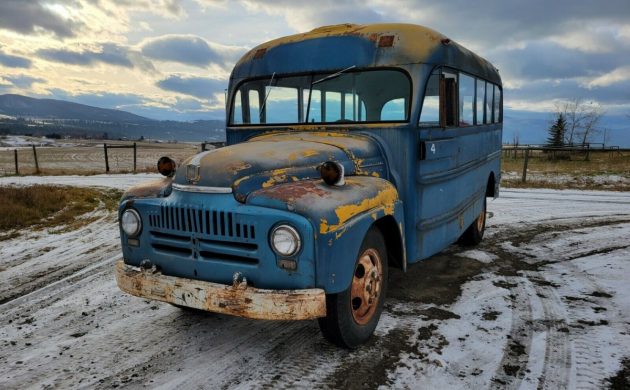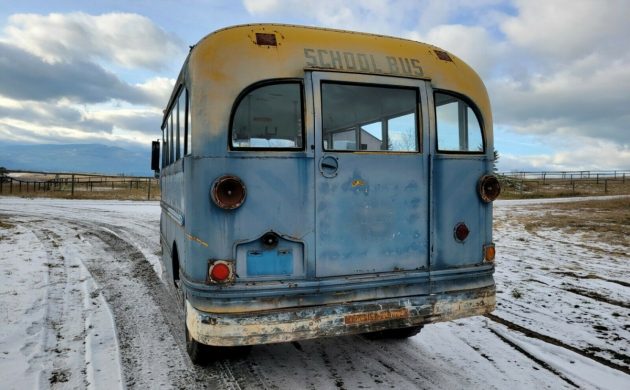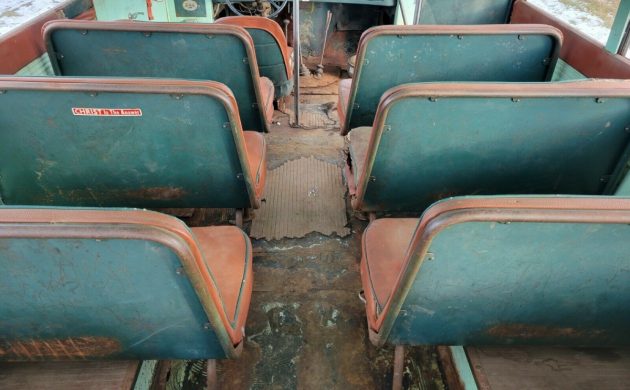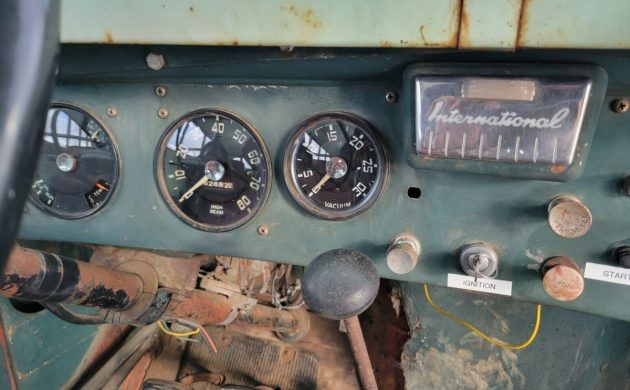When it comes to vintage buses, it’s often the case that well-intentioned owners get to it too late. The bus, once retired, falls into private hands that simply need a lot of space and a lot of seats, which doesn’t translate well to a user who plans to restore it. On top of that, they’ve already led hard lives, first being used for kids who launch their careers as graffiti street artists in the back of a bus, and driven by drivers who have zero ownership stake in its upkeep or condition. So, once a bus like this 1952 International Harvester retires from school life, it becomes a campsite vehicle or used to bring skiers between the lodge and the parking lot – hardly a glamorous retirement. That’s why this surprisingly well-preserved bus listed here on eBay is so captivating, as it managed to land the best retirement possible – as a church vehicle, and evidently with a parish that used it as gently as possible.
Now, this IH school bus is desirable for not only being in largely complete condition but also for being a short-wheelbase model. Like every vintage pickup truck out there, the same rules still apply in terms of shorter being better as it relates to building hot rods or simply having better aesthetics. Short wheelbase models have long been a must-have in the pickup truck world, owing to a variety of factors but seemingly most important being how they look when modified. I’m not sure this International Harvester bus should be chopped up and slammed, but there’s no denying it would look pretty killer if it was. Is there a big following for restored school buses? I’m sure there is, as there’s a following for practically everything, but it still must be one of the smaller enthusiasts factions.
To me, what’s most amazing about this bus is the fact that all of its original seats are still bolted in. The seller is absolutely correct that this is one of the more notable features, as the first thing that usually happens to these buses after they fall into private hands is the seats are ripped out either in pieces to create more legroom, or entirely to begin a camper conversion that inevitably stalls. If you’re into preserving old buses, this is a goldmine of originality as finding the correct International Harvester seats after this many years would likely prove near impossible. The seller further notes that no holes have been cut in the roof and the original dash hasn’t been cut up, either.
The IH does run, with the seller believing it comes with a BD-240 inline-six. The engine hasn’t been touched, really, as the seller explains it still needs a new carburetor and has the usual oil seepage for a vehicle this age that hasn’t had a full reseal done. It drives well enough for the purpose of loading, and on a related note, the manual transmission with granny low and reverse also works as it should, with no funny business coming from the clutch. The brakes work and even the vacuum-operated wipers still function. Perhaps the biggest pain for the next owner will be finding a replacement piece of windshield glass. Overall, you have to wonder who the old-school mechanic was that maintained this vintage bus for the church, as it seems too complete and functional for either condition to be an accident. How would you restore it?









“Shorty” school buses mean different things to different people. For rural folks, a shorty bus was normal, due to the lack of students. In a city, however, a short school bus was for , um, challenged kids, although, we were much more cruel.This one, have to bring out the big guns here, Geomechs, our resident IH expert,,but I can add this. This is the short lived “L” series, that replaced the KB model. It ran until ’52, when the “R” model replaced it( different grill only) This is a L180, and probably has the BD (Blue Diamond) 269 . The SD ( Silver Diamond) 220/240 was for lighter models. This has a different grill, and what looks to have a 2 speed aux. trans( ?), and as mentioned, that’s a vacuum gauge, not a tach, ( although tachometers were used in that space on some) not that the motor spun much higher, they were low rpm motors with torque up the ying yang.
Now for the age old question, what to do with it? People live in these things here, however, the wind is a blowin’ today and 19 degrees, I’ll take my 4 walls, thank you. Sky( and pocketbook) the limit here.
Windshield is flat glass so that should not be a problem. There are more options for this rig that a whole bus load of BFers could come up with so hang on folks!
No fog at all on instrument cluster , looks great, completely cool bus, so many uses, great advertising bus.
One reason seats are often ripped out is because if it will carry more than 15 people, including driver, a CDL is required to drive it, so enough seats are removed to stay below the limit.
I think this would be great for a vendor who sells memorabilia at antique car shows and similar gatherings. It would certainly be an attention getter.
Reminds me of the movie “Into the Wild”.
I’d paint it with a ’60s “woodstock” vibe: Psychadellic, Day-Glo , with peace signs, etc,
On the sides, where the name of the school district would have been, I would paint ” THE CAN-A-BUS”!!!
It could be a MOBILE DISPENSARY (or at the very least, A HEAD SHOP!
as the addage goes:
”if you can remember the 60’s ,you weren’t there!!
(of course, an L88 swap would make it even better!)
This has actually held its age quite well. I wish the hood was open so I could see the engine. It looks like an L-160; I seldom saw a 170 chassis supporting this size of a bus body. A quick way to identify the engine is to look where the distributor is. If it’s up above the valve cover it’s the Blue Diamond series that eventually morphed into the Black Diamond family. If it’s down below in the normal position it’s the SD/B/BD/BG family. The SD/B series has the valves running in a straight line but come ’55/’57 the intakes were canted at an angle. It’s easy to spot the difference as the later one has a wider valve cover. For this one I’m going to guess a Silver Diamond 240. If you look at the RH front side of the engine block, just under the head, there is a raised, machined pad that should have the engine model, size and serial number. I might add that it’s on the LH front if it’s BLD or RD series. Interesting enough the serial number that’s listed in the add is actually the engine ID information from the data plate. The VIN is usually on the line below that. Like Howard says, ‘What do you do with it?’ There are some people out there who collect vintage buses and the more power to them. The sheet metal is in really good shape so I would hate to see it butchered. I see someone has already boosted the horizontal grill bars and that’s a shame; they command a premium price among collectors as good ones are about as common as the winning Powerball ticket.
For the money it would take to bring this back to life. Is it really worth it? To many other nice rides out there. Maybe someone like Jay Leno.
The school bus I rode as an elementary kid was a 1951 IH, much like this one except mine was a 54 passenger with a Wayne body. I think this one has a Superior body. Anyhow our driver (named Oliver) had a heck of a time shifting gears on the darn thing. I still remember some of the older boys in the back yelling “Grind me a pound Ollie!” as we would head down the road to school.
A lot of drivers had trouble mastering that old T-9 crashbox. Straight-cut gears were a challenge but not impossible. Of course if you run one in combination with a 2-speed axle you’re in for a good challenge…
The Dashboard is like when they had in the Chevy Pick-Ups from the late 40’s to the early 50’s and the vacuum guage must have been the old style Vacuum Brakes we had the old Trailer which same with a especial control for the vacuum Brakes it attached to the Steering Colum
Ended: Dec 07, 2021 , 5:35PM
Current bid:US $4,900.00
[ 9 bids ]
Reserve not met
Located in:Eureka, Montana
Restore it with original appearance and a modern drive train and use it to tow your antique car to shows around the country.